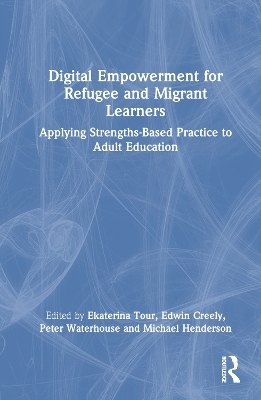
Digital Empowerment for Refugee and Migrant Learners
Routledge (Verlag)
978-1-032-72867-4 (ISBN)
- Noch nicht erschienen (ca. April 2025)
- Versandkostenfrei innerhalb Deutschlands
- Auch auf Rechnung
- Verfügbarkeit in der Filiale vor Ort prüfen
- Artikel merken
This edited collection focuses on digital empowerment for displaced people from migrant and refugee backgrounds, exploring the intersections of digital technologies, settlement, education and global migration. The book adopts a strengths-based and inclusive approach to understand what digital empowerment means and how it can be applied in a range of community and educational settings.
The ten chapters bring attention to the need for innovative approaches and educational strategies that promote digital empowerment for people from refugee and migrant backgrounds, with application to finding employment, furthering education, building community, and accessing social support services. The text also considers what is necessary for effective digital empowerment, highlighting how existing personal resources can be utilised, in conjunction with technologies, to build capacity, enhance community networks and preserve cultural connections. By adopting a strengths-based perspective, the writers highlight how challenges can be transformed into opportunities. Through conceptual understandings, grounded examples and case studies each chapter offers clear and actionable takeaways for policy, practice, and research.
Based on cutting-edge theory, this is an essential read for social and educational researchers, teacher educators and their students, policy makers, and educational practitioners.
Ekaterina Tour is a Senior Lecturer in the Faculty of Education at Monash University. Her research focuses on the digital literacies of students from refugee and migrant backgrounds and has examined teaching and learning with technologies, digital multimodal composing, generative AI and technology use in culturally and linguistically diverse communities. Edwin Creely is Senior Lecturer at Monash University specialising in digital literacy, creativity and technology in education. His research focuses on qualitative inquiry, literacy practices, critical discourse analysis and educational innovation with technology. He is an accomplished educator and researcher with a strong commitment to fostering creative and critical thinking in education. Peter Waterhouse is Lecturer in the School of Education Culture and Society, in the Faculty of Education at Monash University. He has diverse research interests in adult learning and literacies, digital literacies, and the nature of reflexive practice and experiential learning. Michael Henderson is Professor of Digital Futures, and Director of the Hub for Educational Design and Innovation in the Faculty of Education at Monash University, Australia. His research focuses on the intersection of digital technologies and education, with a particular interest in the risks and opportunities for learning and equity.
Introduction
Part 1: Conceptualising digital empowerment
1. Digital empowerment: A new conceptual model
2. Super jagged literacies: Superdiversity, jagged profiles, and digital literacies in refugee and migrant education
3. Artificial Intelligence and the digital dis/empowerment of migrant and refugee learners
Part 2: Exploring digital empowerment
4. Reading the web as reading the world: How three refugee background Karen families are empowered via digital technologies
5. Digital empowerment and relationality: perspectives from experiences of older Karen refugee-background adults in Australia
6. Recent immigrants, digital literacies and empowerment for education and professional life
7. Online Early Childhood Education and Care experiences of refugee communities during COVID-19
8. Building digital resilience in migrant and refugee communities: Leadership from an Adult Community Education provider
9. Conditions of possibility for digital empowerment of people seeking asylum in Australia: making alternatives to exclusion through empathic solidarity and digitally enabled spaces
10.“This is our safe space”: Exploring the agentic curation of digital spaces and online communities in forced migration and (re)settlement.
| Erscheint lt. Verlag | 30.4.2025 |
|---|---|
| Zusatzinfo | 4 Tables, black and white; 3 Halftones, black and white; 3 Illustrations, black and white |
| Verlagsort | London |
| Sprache | englisch |
| Maße | 156 x 234 mm |
| Themenwelt | Geisteswissenschaften ► Sprach- / Literaturwissenschaft ► Sprachwissenschaft |
| Sozialwissenschaften ► Pädagogik ► Erwachsenenbildung | |
| ISBN-10 | 1-032-72867-1 / 1032728671 |
| ISBN-13 | 978-1-032-72867-4 / 9781032728674 |
| Zustand | Neuware |
| Informationen gemäß Produktsicherheitsverordnung (GPSR) | |
| Haben Sie eine Frage zum Produkt? |
aus dem Bereich


